Regan took the world into her arms. She embraced her partner, her parents and her many friends-human and animal alike. She held us all close. And now we are faced with the sad task of letting her go.
By Anne Bokma
Published July 14, 2020
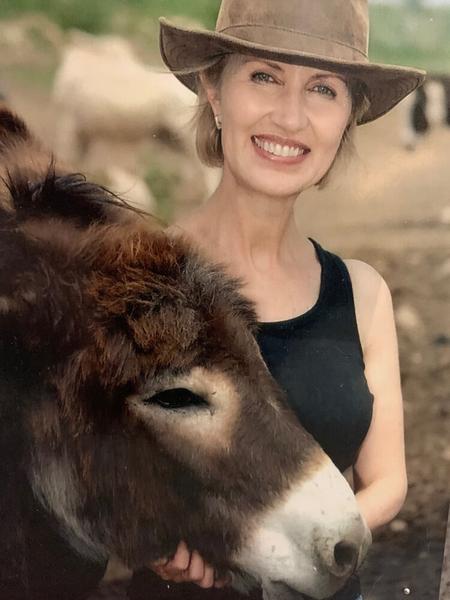
Regan Russell
How do you make sense of a senseless death? What do you hold onto when you are unmoored by the tragic killing of someone you loved? How do you get on with the mundane but necessary aspects of your days - work, dinner, taxes - when you are dragged down by a heavy heart?
These are some of the questions Regan Russell's family and friends have been grappling with since her sudden death on June 19 at 10:20 a.m. when she was run over and killed by an 18-wheel livestock truck crammed with hundreds of pigs being delivered to Fearmans Pork slaughterhouse in Burlington during an animal rights protest and vigil organized by the Save Movement, a network of activists around the world who strive to draw attention to the cruelty of modern-day meat production.
It is not yet known if her death was intentional. There is an ongoing criminal investigation. As you can see from this video taken in the exact same spot Regan was killed, the truckers could be extremely aggressive with the protestors.
Regan was one of those friends I imagined growing old with. We even talked about living together in the same co-housing setup one day. Her life was cut short when she was doing what she had done every Sunday morning for years. In the parlance of animal rights activism, Regan, was "bearing witness" to the pigs before they were killed.
She would reach in through the metal grates of the trucks and give them water through a hose attached to a jug. She took cell phone videos of the animals to document their suffering. She was there to show them the only compassion they'd ever known in their lives.
For two minutes (the informally agreed-upon amount of time between the truckers and the protestors) the drivers idle in their vehicles on the road outside the slaughterhouse while the activists view and give water to the pigs before they are led into hog hell where they are gassed, dumped in scalding tanks, hung up, bled out, cut up, neatly packaged in cellophane and styrofoam and shipped to grocery stores.
I'll spare you more of the gruesome details of the miserable lives and deaths of these animals but you can learn more here.
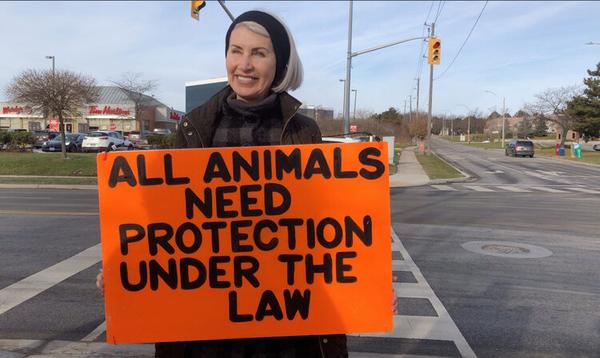
Regan protested outside Fearmans Pork slaughterhouse in Burlington every Sunday.
Her Sunday vigils were her form of church. The other protestors were her community. Witnessing was her way to worship. On this particular day, a Friday, she was there to protest the Ontario government's Bill 156, known as the agriculture or "ag-gag" law, which had passed two days earlier and makes it a criminal offense for anyone to document and expose animal cruelty on farms and during transport.
The meat industry does not want us to see what goes on behind closed doors before the bacon hits our breakfast plates. The massive Fearmans' factory, which takes up the space of several city blocks, doesn't appear to have a single window. It's set way back from the road, yet you can still hear the far-off sound of terror from the collective squeals of the desperate pigs.
Regan's last Facebook post, the day before her death, read: "Bill 156 has passed. Now, any time an animal is suffering on a farm in Ontario, no one, not even an employee, has the right to expose it. This decision is evil."
She devoted her life to bringing attention to the harmful treatment of animals, beginning in 1977 when she was 22 years old and learned about the inhumane slaughter of Canadian baby seals who are clubbed to death.
She made a sign, marched to the legislative building in downtown Winnipeg (where she was living at the time) on a cold winter day and stood around for several hours. In her youthful naivety she actually thought this could stop the seal hunt. Of course, it didn't.
But it was the start of more than 40 years of activism with organizations ranging from Animal Justice to pToronto Pig Save, the Animal Alliance of Canada, pPeople for the Ethical Treatment of Animals, World Animal Protection and Zoo Check.
She worked as an educator in public schools with the SPCA's Kindness Club, teaching children that part of being a good human being is treating animals with compassion. She travelled to remote areas of Canada with a team of volunteer veterinarians to teach communities about the importance of spaying and neutering domesticated animals. She regularly brought feral cats to the SPCA and paid out of her own pocket for them to be spayed and neutered.
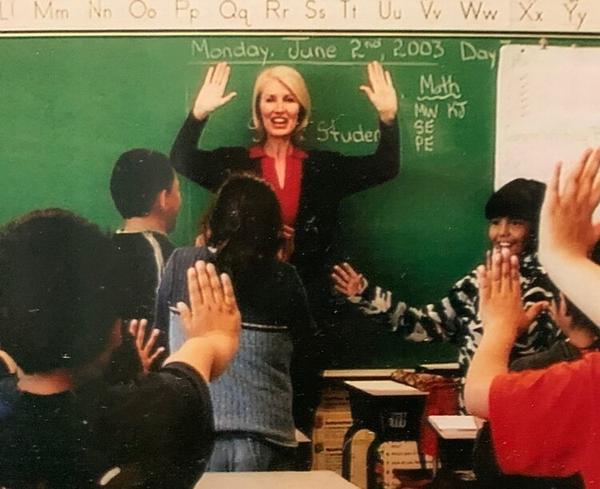
Teaching with the Kindness Club, 2003.
In death she is being recognized in vigils around the world and by high profile people ranging from PETA president Ingrid Newkirk, Greenpeace co-founder Paul Watson and Academy Award-winning actor Joaquin Phoenix, who acknowledged Regan for spending "the final moments of her life providing comfort to pigs who had never experienced the touch of a kind hand."
Activists are carrying out a range of creative actions in her name, from "liberating" 50 turkeys from a farm in the U.K. to negotiating the release of two pigs (now named "Regan" and "Russell") from a factory farm in Iowa to gluing themselves to the road outside the Canadian embassy in London, England.
Her death has unexpectedly launched her into the limelight, but for those who knew Regan, she was a beloved daughter, partner and friend who was as unique as her moniker. (She was named after one of the daughters in Shakespeare's King Lear and liked to joke that she was thankful her parents didn't saddle her with the name of one of the king's other daughters - Goneril.)
I felt lucky to be in her circle. I'd known her for a decade but we got close five years ago when she was the first person to respond to a call I put out asking if anyone was interested in staging an indoor protest during Bill Cosby's appearance at Hamilton Place, on the final leg of the comedian's boldly touted "Far From Finished" tour.
At the time, Cosby had been accused by 30 women (the number would eventually increase to 60) of drugging and sexually assaulting them. Regan, a seasoned activist, offered guidance on the finer points of protest-how to ensure no one got hurt and how to avoid criminal charges while getting our message across.
Her then 85-year-old father, Bill Russell, and her partner, Mark Powell, were among the four men who were part of our group of 30. It was Regan who blew the rape whistle that pierced the air 15 minutes into Cosby's show, our cue to stand in unison, unfurl our posters and rise up chanting "We Believe the Women!" over and over while we slowly walked out of the theatre under the watchful eyes of police officers and security guards.
The next day, our small act of defiance made headlines. This was a big deal for me, but not so much for Regan who'd been arrested 11 times for acts of civil disobedience. Heading to a protest was about as routine for her as heading to the grocery store. (Shortly before she was killed, she was part of a local Black Lives Matter rally.)
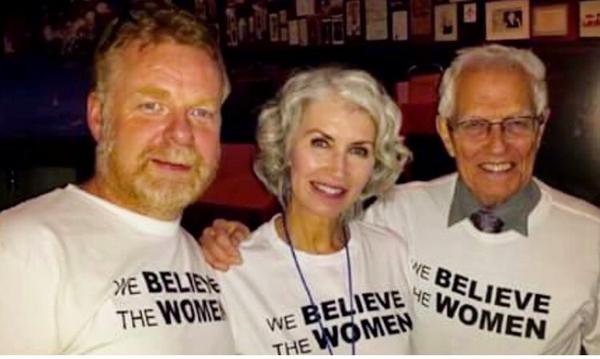
Regan with her partner Mark and her father, Bill at the Bill Cosby protest in 2015.
Regan was bold in her determination to protect animals-to the point of carrying bolt cutters in the trunk of her car in case she needed to cut through a fence to save an animal in distress. Weeks before her death, she went on a covert mission to northern Quebec to investigate reported abuse in the sled dog industry.
Every year, she defiantly stormed the fences in an annual protest at the controversial Marineland amusement park in Niagara Falls. Captured on video (watch at the 5:37 minute mark), she said, "People say we're breaking the law by storming? How do you think women got the right [to vote]? How do you think slavery was abolished? People stood up and broke laws."
"I don't know if it does any good," she once said of her activism. "But I know doing nothing does no good."
Regan did a whole lot of good. Activists like her have helped to change laws. Last year, for example, Canada passed the "Free Willy" bill, making it illegal to hold whales and dolphins in captivity.
She was remarkably fierce, but tender, too. She once told me she often had trouble sleeping at night because it was hard to erase the images in her head of the faces of the terrified animals she'd encountered on her protests. She loved her cats - all seven of them: Nigel, Sarma, Lyla, Itsy Bitsy, Solee, Eric and Kevin. ("They miss her," says her mother, Pat. "They search for her.")
She knew how it felt to have your heart broken. She'd been married twice and got lucky the third time when she found Mark, a man she could sing and dance with, a man who made her laugh. "I'm the bail money," he liked to say of his supportive role in Regan's activism.
The night before she died, she and Mark and her parents sat in their backyard talking about Bill 156. "Honey, maybe it's time to pass the torch on to the next generation," Mark suggested. But the next morning she got up at 8 a.m. to make the trek to Fearmans. She kissed Mark goodbye before she left. Two hours later she was dead.
"She died fighting for what she believed in," says Mark.
Her parents, Bill, 89, and Pat, 90, still have each other to hold onto. They are remarkable people and Regan appreciated them. A couple of weeks before her death she sent them a card in the mail (disguising her handwriting on the envelope) to tell them how grateful she was to have them as parents. "It seems prescient now," says her father.
They, in turn, adored her. Thirty years ago, she gave her father, a retired teacher, a copy of Peter Singer's seminal book, Animal Liberation, which is widely credited as the catalyst for the modern animal rights movement. He immediately became a vegetarian. Speaking at a vigil in Regan's honour two days after her death he said, "My daughter changed my life. I taught her in Grade 7 and 8. And in later life I became the pupil. She was the greatest teacher I ever had."
Her mother, equally gracious in her mourning, told the assembled crowd: "She doesn't belong to us anymore. She belongs to all these people here."
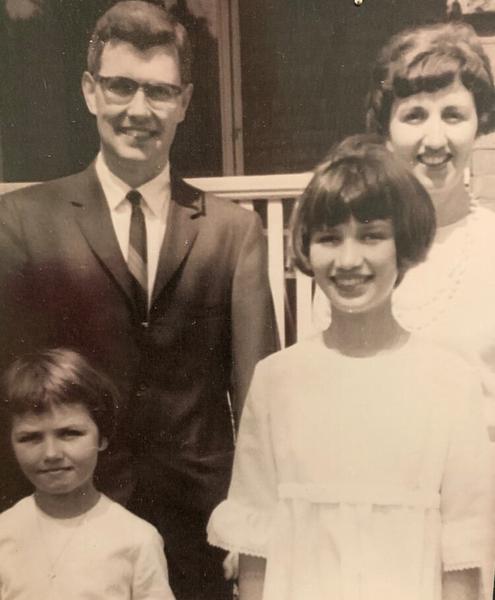
Regan with her parents, Bill and Pat Russell, and her sister Shannon in the 1960s.
Perhaps a picture of Regan is forming in your mind. Let me help fill it out. She was larger than life. Almost six feet tall, she'd been a professional model for many years-in fact she was the Mrs. Canada contestant in the Mrs. Of the World pageant presided over by Richard Dawson in Hawaii in 1984.
During her brief speech when she was asked how she would make the world a better place, she seized the opportunity of being on centre stage to talk about the importance of animal rights-before hastily finishing up with the obligatory mention of world peace.
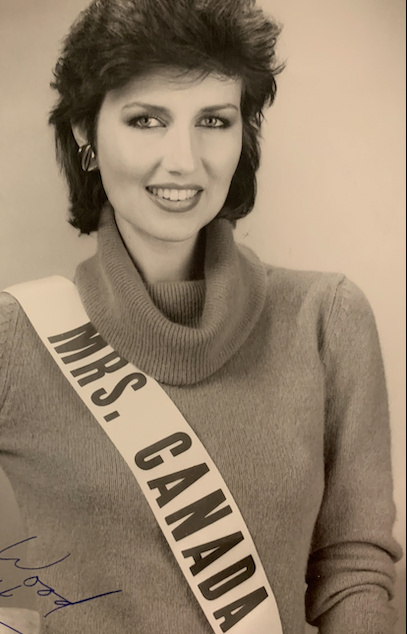
Mrs. Canada
She was down to earth, most comfortable in jeans and band T-shirts. She had a gorgeous head of thick grey curly hair that she cut herself.
Going on a walk with her was a unique experience because she felt compelled to acknowledge any animal that crossed her path, whether it was a dog, a squirrel or a snail.
She was like a modern-day Snow White who literally talked to the animals.
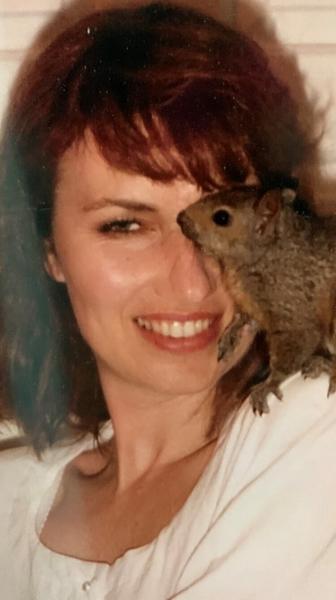
Regan with a squirrel
Regan was confident in her opinions and her laughter was raucous. Most of all, she was generous. She was the kind of friend who would drop off homemade soup on your porch if she heard you were sick, something she did for me more than once.
She formed intense bonds with her girlfriends. Her oldest and closest friend Lynn, also a former model who lives in Holland and would visit a couple of times a year, describes Regan as her soul mate. "We formed an instant connection when we met more than 40 years ago. I never knew anyone like her. I loved her more than any man or woman I ever knew."
Last year at a dinner celebrating Regan's 65th birthday, her long-time friend Donna read out loud to her a list of 35 things she loved about Regan (i.e., "That no special occasion feels right unless you are there." "That you feel like home." "That your generosity is a constant.") The list was a cinch to write, says Donna.
She never had children of her own, yet kids of all ages connected easily with her, from Tilley, her eight-year-old neighbour girl, to 11-year-old Dawson Roossein (whom she nicknamed "Awesome Dawson"), the youngest regular protestor at Fearmans. He spoke through his tears at her vigil about his admiration for her: "She was a fighter...a hero. She was so smart and inspiring. I loved Regan and will never forget her."
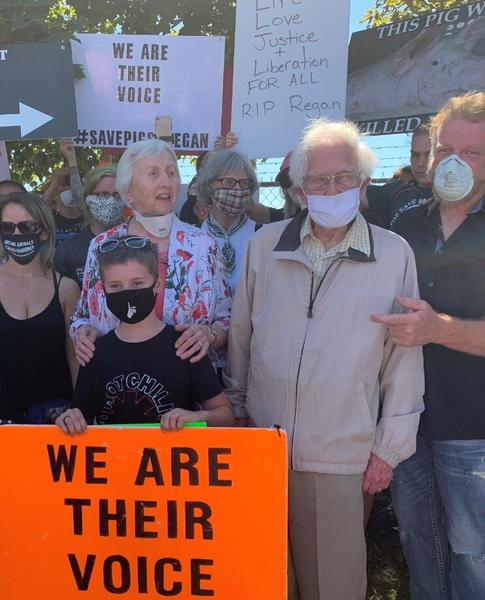
11-year-old 'Awesome Dawson' in the foreground with Regan's parents and partner.
Not all of her friends are vegetarian or vegan. She called our mutual friend Ed her "favourite carnivore." She was not preachy about her politics, but she was passionate and led by example, showing us, for instance, how tasty vegan food could be by contributing delicious vegan dishes to our potlucks. One Christmas she wowed everyone with an elaborate multilayered vegan trifle that was just as decadent as the dairy-laden version.
Regan's death has a lot of people, me included, thinking about what they eat and whether we have a moral obligation to reduce the suffering of animals, especially factory-farmed animals who endure the worst kind of torture. Regan was a big fan of Paul McCartney, who famously said, "If slaughterhouses had glass walls, everyone would be a vegetarian." He helped produced a 13-minute documentary to show people exactly what he meant.
The death of anyone who is close to us makes us consider how we are living our life. And when a death is as shockingly violent as Regan's was, it brings a sense of urgency to our days and a stark realization of just how fleeting life can be. Confronted with death, we are made suddenly alert to the transitory nature of our existence. Many who knew Regan have felt adrift these last weeks. We realize all that's left to hang onto is each other.
The late great poet Mary Oliver wrote about the prospect of death with a spirit of grace and gratitude, even anticipation:
"When death comes...I want to step through the door full of curiosity, wondering: what's it going to be like, that cottage of darkness?...When it's over, I want to say all my life I was a bride married to amazement. I was the bridegroom, taking the world into my arms."
Regan took the world into her arms. She embraced her partner, her parents and her many friends-human and animal alike. She held us all close. And now we are faced with the sad task of letting her go.
At the funeral home, her mother Pat placed Regan's beaded baby bracelet next to her body in the plain wooden casket the family picked out for her. Mark kissed her forehead over and over, each time repeating the name of someone who loved her. He was there for a long while. There were a lot of kisses because there was so much love.
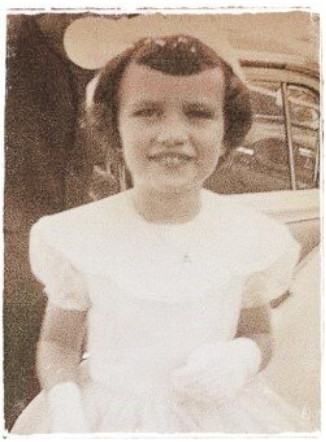
REGAN RUSSELL - 1955-2020
A GoFundMe campaign has been launched to continue Regan's work, repeal Bill 156 and assist the family.
This article was first published on Anne Bokma's website.
By williamguyatt (registered) | Posted July 23, 2020 at 06:47:06
A beautiful profile. Thank-you Ms Bokma.
You must be logged in to comment.
There are no upcoming events right now.
Why not post one?